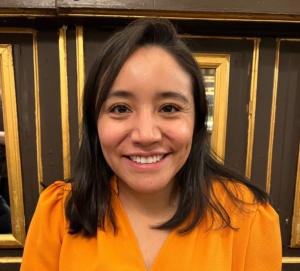Growing up in Puebla, Mexico, Alejandra Quintos always had a natural ability for mathematics, but was unsure of what one could do with a degree in math.
After taking a probability and statistics class during her undergraduate degree in actuarial science, she fell in love with the concepts.
She then went on to complete her Ph.D. in statistics at Columbia University, where she was a Fulbright alumna, a Howard Levene Outstanding Teaching Award recipient, and a 2020-2021 and 2021-2022 Columbia University Presidential Award for  Outstanding Teaching by a Graduate Student finalist.
Outstanding Teaching by a Graduate Student finalist.
Now, as an assistant professor and Nellie McKay Fellow in the Department of Statistics at the University of Wisconsin-Madison, she is hoping to positively impact her students’ lives, just like her professors changed hers for the better.
“I find it fascinating to be able to pass on knowledge to other people. Seeing my students’ faces when they have ‘aha moments’ is priceless,” says Quintos.
Quintos was attracted to the strength of the UW-Madison Department of Statistics, as well as the interdisciplinary research that happens across the university.
Quintos’s research focuses on producing mathematical models using tools from probability, stochastic processes, and statistics. She hopes these models will be applied on mathematical finance problems, like characterizing the probability of the default of the market or understanding how microlending works.
She is also a visiting professor at Universidad Nacional Autónma de México during the 2023-24 school year.
“I think that diversity of ideas is a key element for good research and being here means being exposed to many different and innovative researchers. I am grateful to be able to network and interact with Mexican professors and students. It is an honor to be representing UW-Madison,” says Quintos.
With Latinx people making up only 10% of mathematicians, Quintos believes it is her duty to keep breaking stereotypes and opening doors for new generations of women and Latinx mathematicians.
“I am privileged to be where I am today. It has by no means been an easy road, but I have been so fortunate to have many good mentors and supporters along the way,” says Quintos. “I have worked really hard to get here. My hope is that in some years, it is not so surprising that a Latina woman is a professor in a STEM field.”
Her advice to future Latinx mathematicians? Do not disqualify yourself before applying to opportunities.
“If you never try, you will never know. Or as we say in Mexico, ‘el no ya lo tienes.’. It might be the opportunity that will change your life,” says Quintos.